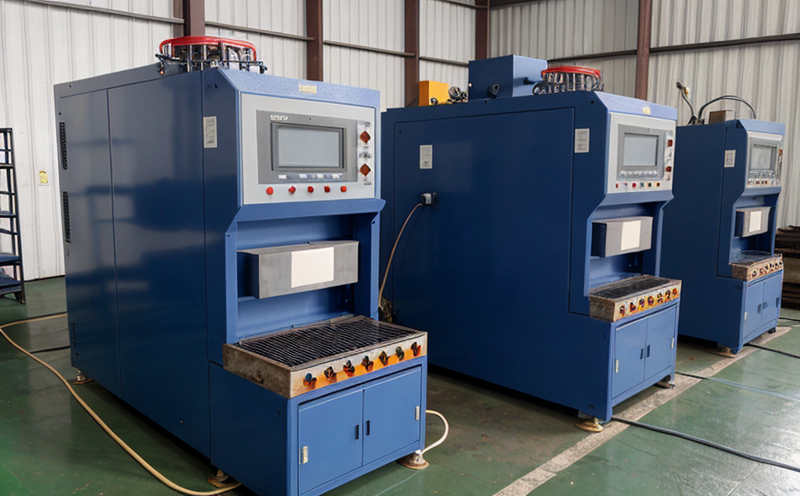EN 15169 Coal Ash Bulk Density Testing
The European standard EN 15169 provides a framework for proficiency testing of coal ash, which is crucial in industrial manufacturing and processing. This standard ensures that laboratories involved in the analysis of coal ash meet stringent quality requirements. Coal ash testing is essential for industries such as power generation, cement production, steelmaking, and waste management.
Coal ash is a by-product generated during fuel combustion processes. It contains various minerals like silica, alumina, iron oxide, calcium oxide, among others, which are valuable in the manufacturing of industrial products. The quality of coal ash directly impacts the efficiency and performance of these industries. Accurate determination of bulk density helps in optimizing raw material usage, reducing waste, and ensuring compliance with environmental regulations.
The bulk density test measures how closely packed particles are within a given volume. In the context of coal ash, this parameter influences the material's handling properties, reaction kinetics, and overall performance in industrial processes. The EN 15169 standard specifies detailed procedures for sampling, preparation, and analysis to ensure accurate results.
The testing process involves several steps:
- Sampling: A representative sample is taken from the coal ash batch to ensure that it reflects the properties of the entire batch. The sample size should be sufficient for multiple sub-samples if required by the test.
- Sample Preparation: The raw sample undergoes sieving and drying processes to remove impurities and achieve a consistent particle size distribution. This step is critical as it ensures that the bulk density measurement reflects the true properties of coal ash particles.
- Density Measurement: The prepared sample is placed in a calibrated container, and its mass is measured accurately using precision scales. The volume of the container is known precisely due to its calibration. Bulk density is calculated as the ratio of mass to volume.
The EN 15169 standard also includes guidelines for retesting if initial results are not within acceptable limits, ensuring reliability and consistency in test outcomes. This standardized approach enhances trust among stakeholders and supports regulatory compliance.
Understanding the bulk density of coal ash is vital for optimizing industrial processes. For instance, higher bulk densities may indicate a more compact material, which can reduce transportation costs but also increase handling challenges if not managed properly. Conversely, lower bulk densities might imply easier handling but could lead to increased storage space requirements.
By adhering to EN 15169, industries can ensure that their coal ash is consistently of high quality, thereby maintaining product performance and reliability across various applications.
Why It Matters
The significance of EN 15169 Coal Ash Bulk Density Testing extends beyond mere compliance with regulatory standards. This testing ensures that the coal ash used in industrial processes meets specific quality criteria, which is critical for several reasons:
- Quality Assurance: Ensures consistent and reliable results across different batches of coal ash.
- Cost Efficiency: By optimizing material usage, industries can minimize waste and reduce operational costs.
- Environmental Compliance: Accurate bulk density testing helps in adhering to environmental protection regulations by ensuring the safe disposal and utilization of coal ash.
In industrial manufacturing, where precision is paramount, accurate bulk density measurements are essential. For example, in cement production, the quality of coal ash directly affects the strength and durability of concrete products. Similarly, in power generation, precise control over the properties of coal ash can enhance boiler efficiency and reduce emissions.
Moreover, EN 15169 ensures that laboratories conducting these tests are proficient and reliable. This proficiency is crucial for maintaining trust among stakeholders, including suppliers, buyers, and regulatory bodies. The standard's rigorous requirements contribute to a more transparent supply chain, where all parties can rely on consistent quality.
In summary, EN 15169 Coal Ash Bulk Density Testing is not just about meeting standards; it’s about ensuring that industrial processes are optimized for efficiency, cost-effectiveness, and environmental responsibility. This testing plays a pivotal role in maintaining the integrity of coal ash as a valuable raw material.
Benefits
- Enhanced Quality Control: Ensures that coal ash meets stringent quality criteria, leading to consistent and reliable product performance.
- Economic Efficiency: Optimizes material usage, reduces waste, and minimizes operational costs across the supply chain.
- Regulatory Compliance: Adherence to EN 15169 ensures compliance with international standards, enhancing trust among stakeholders.
By implementing EN 15169 Coal Ash Bulk Density Testing, industries can achieve a competitive edge by maintaining high-quality raw materials. This ultimately leads to improved product performance and enhanced reputation in the market.
Eurolab Advantages
Eurolab offers comprehensive EN 15169 Coal Ash Bulk Density Testing services, leveraging its expertise and state-of-the-art facilities. Our team of experienced professionals ensures that every test adheres strictly to the standard’s requirements.
- Accurate Results: Precision in sampling, preparation, and analysis guarantees reliable bulk density measurements.
- Comprehensive Reporting: Detailed reports provide insights into coal ash quality, supporting informed decision-making processes.
- Proficiency Testing Support: Eurolab assists laboratories in meeting proficiency testing requirements through regular training and support.
Our commitment to excellence and adherence to international standards positions us as a trusted partner for quality assurance in industrial manufacturing and processing. Contact us today to learn how we can help your organization achieve superior coal ash quality.





